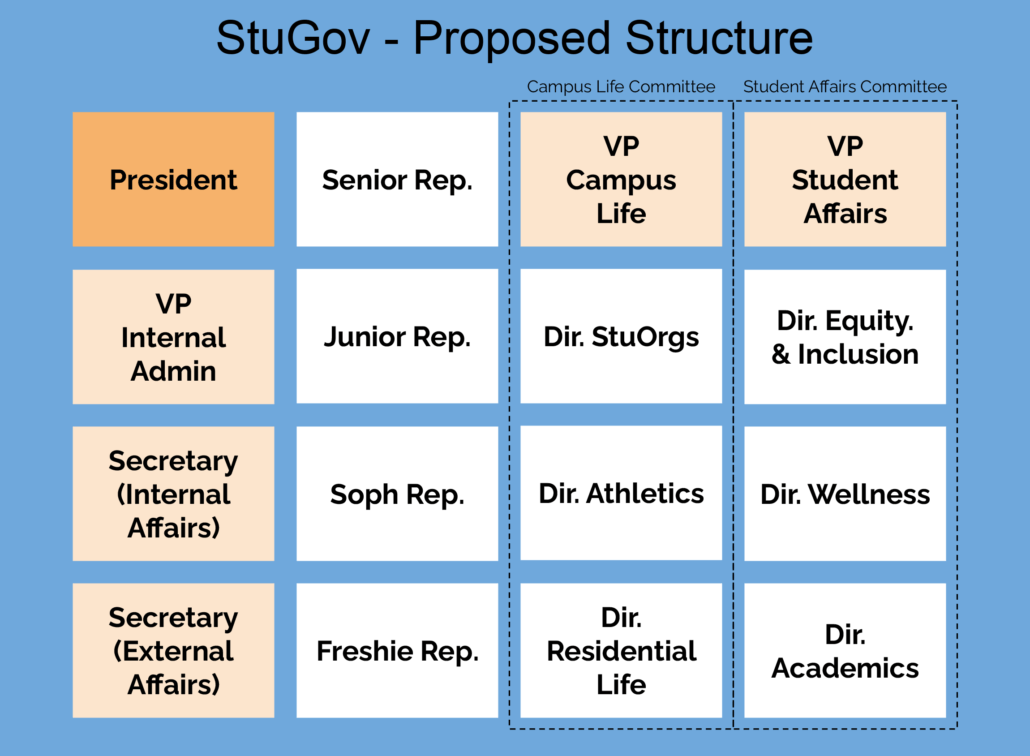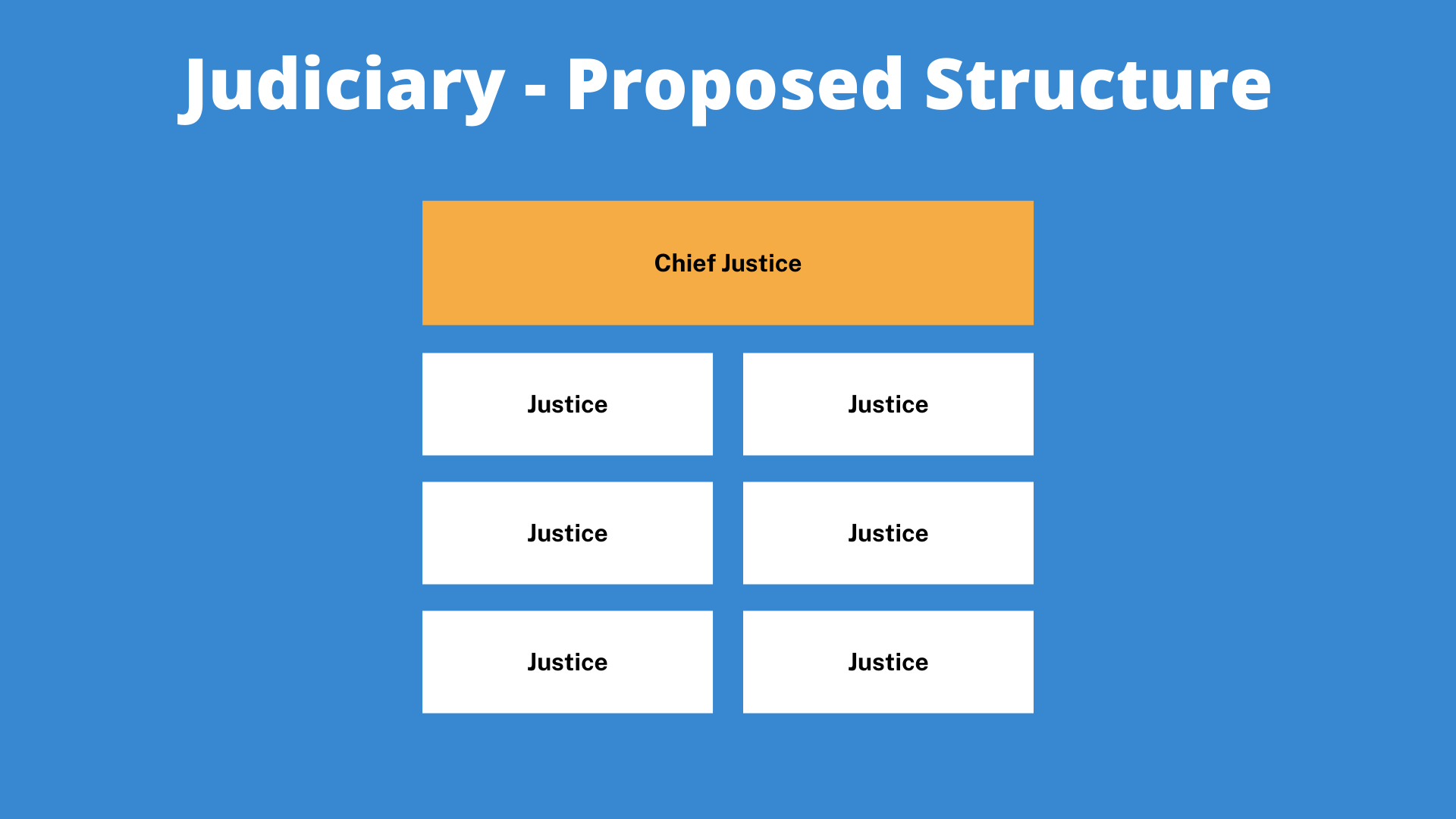Published 26 Mar 2022
StuGov Restructuring 2022
In light of the merger, there has been a growing sentiment among StuGov members that the current StuGov structure might be too large as the student population declines over the years. Therefore, StuGov convened a Restructuring Project Team to create more focused roles and clarity on responsibilities of StuGov. The new structure is up for student review and input from Sun 27 March until Tue 29 Mar 2359hrs.
Background
Purpose of StuGov
Among members, the consensus is that StuGov’s role is advocacy and representation. Advocacy refers to advocating for student interests and pushing for policy changes by engaging with stakeholders such as College staff/faculty and NUS College (NUSC) administration. Representation refers to representing student views and providing input on behalf of students. In light of the establishment of NUSC, StuGov members feel that StuGov should continue to exist as an independent entity, separate from NUSC’s student government equivalent, in order to dutifully represent and advocate for Yale-NUS’s student interests. Additionally, StuGov will continue to promote transparent and open communication between NUSC’s Student Government equivalent, Yale-NUS administration and NUSC administration.
In order to fulfil these purposes, StuGov members listen to student sentiments and gather opinions on a wide variety of issues, conduct surveys, consolidate the input, craft proposals, attend regular and ad-hoc meetings with College staff/faculty, provide feedback on College policies, speak up on students’ behalf, and take any other forms of action to convince College staff/faculty to make decisions that align with student interests.

Issues with Current Structure
Current members identified the following challenges:
- Disproportionately large StuGov as the YNC student population decreases in the following years
- From AY23/24 and AY24/25, StuGov’s structure should be subject to another round of review and/or restructuring to better reflect a student population (approx 500 students) which comprises only/both seniors and juniors.
Principles of New Structure
Members suggested the following principles that should guide the new structure:
- Improved efficiency
- Smaller StuGov
- Broader portfolios
- Streamlined Judiciary
Proposed New Structure
Changes
- The responsibilities of Secretary for Internal Affairs and Secretary for External Affairs will be combined under the Secretary of Communications, in-charge of communications to both internal and external stakeholders.
- Vice-President for Internal Administration will be renamed to Secretary of Internal Administration to better reflect the responsibilities of the role. The relevant duties of the Secretary of Internal Affairs will be delegated to this role as well.
- Judiciary* positions will be amended from the current seven to a range of four to seven to allow greater flexibility in the number of candidates required to keep the Judiciary running.
- *The Yale-NUS Student Judiciary is a body separate from the Yale-NUS Student Government which will scrutinise the affairs of the Student Government, and ensure their conduct is in line with the Constitution. The amendments are proposed in consultation with the current Judiciary members.
How Will This Affect Students?
- As positions have been streamlined, there will be a more efficient workflow, as the responsibilities of StuGov members will be better distributed to meet new demands and challenges, with the establishment of NUSC and a declining internal student population.
President (ExCo)
The President is the primary representative of StuGov and the student body to the College administration and any external body. The President is responsible for setting the agenda for StuGov, appointing candidates to any vacant positions, setting the agenda of Town Halls, and supporting the Vice Presidents, Secretaries, Directors, and Class Reps. Most importantly, the President works for all members of StuGov and the College community, and has to be impartial and fair to all parties.
Past Presidents served as the Yale-NUS Coordinator for the Inter-University Network, and as a liaison with external agencies (eg. Ministry of Education, National Youth Council). They championed student interests on important issues (eg. UCare Mental Health Project, gender equality survey), built collaborative working relations with the College administration and external stakeholders. They also advocated for Yale-NUS student interests as the student representative for the New College Planning Committee, which is now known as NUS College.
Vice President of Campus Life (ExCo)
The Vice President of Campus Life (VPCL) leads the Campus Life Wing, which comprises the Director of Athletics, Director of Residential Life, and Director of Student Organisations. Their primary role is to support their directors in advocating for student interests relating to the three broad areas, and to promote accessible, inclusive, vibrant, and sustainable campus life.
Past Vice Presidents have organised and moderated regular Town Halls and dialogue sessions, StuOrg transitions, and the dining contract renewal process. They have also advocated for various subsidies for Winter Housing and SHN during the Covid-19 pandemic, as well as facilitated food catering arrangements for summer during the lockdown period. They have also worked on issues of housing deficits, housing for superseniors, and Room Draw, especially in light of Study Abroad cancellations and Covid-19. They have worked with the College Councils to help foster collaboration for campus-wide events. They also advocated for Yale-NUS students’ interests in as the representative on the New College (now NUS College) Residential Life Working Group.
The Vice President of Campus Life will not be allowed to concurrently be a StuOrgs Student Associate or Summer Intern, Athletics Student Associate, or Residential Housing/DXT Student Associate under the Dean of Students’ Office.
Vice President of Student Affairs (ExCo)
The Vice President of Student Affairs (VPSA) leads the Student Affairs Wing, which comprises the Director of Equity and Inclusion, Director of Wellness, and Director of Academics. Their primary role is to support their directors in advocating for student interests relating to the three broad areas and to promote the academic, interpersonal, and mental wellbeing of students.
Past Vice Presidents have led their team of Directors to tackle the issues of module planning uncertainty, counselling unavailability and consolidated resources for E&I. Other Vice Presidents have also coordinated with the College administration to organise TGS advising sessions.
The Vice President of Student Affairs will not be allowed to concurrently be an Intercultural Engagement/Wellness Student Associate under the Dean of Students’ Office, as well as a Student Associate under a Head of Studies, the Dean of Faculty, and/or the Executive Vice President (Academic Affairs).
Secretary (Internal Administration) (ExCo)
The Secretary (Internal Administration) manages budget allocation for StuGov, financial processes, logistics, and resources (e.g. online file storage). They ensure that StuGov runs smoothly and is connected internally and with the College administration, by maintaining and developing systems and processes and running the Halcyon Hub page. They are also in charge of preserving institutional knowledge within StuGov.
Past Secretaries (Internal Administration) have worked on administrative processes such as stipend referendum, restructuring of StuGov, a standard procedure for handling crises, and investigating financial accessibility on campus.
The Secretary (Internal Administration) was previously known as the Vice President of Internal Administration.
Secretary (Communications) (ExCo)
The Secretary (Communications) is in charge of communications, both internally (student-facing) and with external stakeholders (external-facing).
They will serve as an admin for key communication channels, such as the Telegram Channel (Kingfisher Chirps), StuGov website, email account, Facebook groups (e.g. Yale-NUS College Community), and the instagram page.They will also maintain external stakeholder relationships by conducting outreach efforts with external parties, alumni, neighbouring residential colleges, and student unions from other universities.
Past Secretaries (Internal Affairs) have revamped the StuGov newsletter, established an anonymous channel of communications, reorganised and streamlined resources, and documents on Halcyon Hub.
Past Secretaries (External Affairs) have worked on the rollout of the Cross Campus Network and organized a series of campus dialogues with Singaporean political office holders (REACH Dialogues). They have also organised the Next Door Neighbour (Yale-NUS x NUS lunch tag) and Inter-College Pen Pal initiatives with neighbouring residential colleges, and worked on Kingfisher Treats (UTown discounts for Yale-NUS students).
The Secretary (Communications) was previously known as the Secretary (Internal Affairs) and Secretary (External Affairs).
Class Representatives
(Includes Senior Rep, Junior Rep, and Soph Rep)
Class Representatives serve as the primary liaison between their class and StuGov and also organise class-wide events. They are able to raise issues affecting their class, advocate for student interests as and when they arise, and advocate for policy changes, by coordinating with the relevant StuGov Directors and other members. They are also in charge of managing the anonymous Speak to StuGov feedback form.
Past Class Representatives have organised numerous welfare events, and were pivotal in advocating for student concerns on pertinent issues (eg. dining, Halcyon’s Fab Feb, Week 7, academic accommodations during COVID-19).
Candidates can run individually or with someone else (as co-candidates). Co-candidates will appear on the ballot together (i.e. cannot vote for only one of them), and if elected, will both serve as Co-Representatives. Candidates running individually will serve alone if elected.
Director of StuOrgs
The Director of Student Organisations (StuOrgs) leads the Student Organisation Standing Committee, whose primary responsibility is to formally recognise StuOrgs, administer budget requests, process StuOrg renewals, and approve travel funding applications. The Director of StuOrgs also works closely with the Dean of Students’ Office to organise the yearly StuOrg Leadership Retreat, and semesterly Student Activities Fair.
Past Directors have served as the touchpoint with StuOrg leaders to support them in their activities. They have established a StuOrgs Master Contact List, worked on accessibility in StuOrgs, organised Tea Party sessions to advise prospective StuOrg leaders, worked with the Director of Wellness to organise a lucky draw for StuOrgs who choose to eat healthy, and helped to promote the usage of the Student Calendar for campus events.
The Director of StuOrgs will not be allowed to concurrently be a StuOrgs Student Associate or Summer Intern under the Dean of Students’ Office.
Director of Athletics
The Director of Athletics leads the Athletics Standing Committee to take on the immense role of project director for the annual Inter-Faculty Games in Semester 1 as well as Inter-College Games in Semester 2. They liaise with the residential colleges and faculties from NUS, and coordinate the logistics and manpower for the sports events delegated to Yale-NUS.
Past Directors have served as the touchpoint for athletic groups to support them in their activities, as well as worked closely with the Athletics office on issues relating to athletics spaces and equipment on campus.
The Director of Athletics will not be allowed to concurrently be an Athletics Student Associate under the Dean of Students’ Office.
Director of Residential Life
The Director of Residential Life advocates for the adoption of policies relating to Housing, Dining and Residential Colleges that align with student interests. They are the primary representative that keeps in contact with the Residential Housing staff and Dining Experience Team (DXT) from the Dean of Students’ Office, Residential College Offices, and Infrastructure, Safety & Security (Infra).
Past Directors have worked on a suite matching spreadsheet to facilitate the finding of suitemates for Room Draw, advocated for changes to the dining hall operating hours in light of COVID-19 restrictions (AY20/21). Other position holders have also worked on the issues of housing deficits and dissatisfaction with dining hall food, and engaged with Infra to resolve accidental room entries.
The Director of Residential Life will not be allowed to concurrently be a Residential Housing/DXT Student Associate under the Dean of Students’ Office.
Director of Equity & Inclusion
The Director of Equity and Inclusion advocates for the adoption of policies that promote an equitable and inclusive environment, and serves as a representative on the College’s Diversity and Inclusion Committee.
Past Directors have led an Equity and Inclusion Standing Committee, established an E&I Masterlist, worked on the Classroom Ethos Statement, and collaborated with the In-Betweeners Collective (First-Generation & Low-Income Students Network). They have also advocated for better learning accommodations and disability support.
The Director of Equity and Inclusion will not be allowed to concurrently be an Intercultural Engagement Student Associate under the Dean of Students’ Office.
Director of Wellness
The Director of Wellness advocates for the adoption of policies that promote the physical, emotional, mental, financial, and academic wellbeing of students, and proposes improvements to programs or structures on campus to achieve this aim.
Past directors have led the Wellness Standing Committee to create a Wellness Resources Masterlist, engaged with the Counselling Centre to expand access to external counselling and worked on the issue of counselling unavailability. They also organised a dialogue on managing COVID-19 related anxiety as well as a dialogue exploring body image and relationship with food. They have also distributed COVID-19 Wellness Care packages and organised mindfulness sessions in conjunction with the Dean of Students’ Office.
The Director of Wellness will not be allowed to concurrently be a Wellness Student Associate under the Dean of Students’ Office.
Director of Academics
The Director of Academics advocates for the adoption of academic policies that promote academic wellness and align with student interests. They usually serve as a representative on the Teaching Learning and Advising (TLA) Committee and Teaching Award Committee. They also help to ensure easy access to and clear communication of academic resources and policies.
Past Directors have been heavily involved in Common Curriculum SU Policy, the Latin Honours review (AY19/20), Capstone review, and Common Curriculum review (AY20/21). They have also advocated for the removal of peer tutoring hour limits, extension of capstone and availability of S/U petitions during COVID-19 (AY20/21), relaxation of no-screen policies, and addition of classes to alleviate module oversubscriptions.
The Director of Academics will not be allowed to concurrently be a Student Associate under a Head of Studies, the Dean of Faculty, and/or the Executive Vice President (Academic Affairs).
On Co-candidacies
For Class Representative and Directorship Roles, candidates can run individually or with someone else (as co-candidates). Co-candidates will appear on the ballot together (i.e. cannot vote for only one of them), and if elected, will both serve as Co-Directors. Candidates running individually will serve alone if elected.
FAQ
Is StuGov a government?
Some members have pointed out that “Student Government” is not an accurate representation of the work that StuGov does. StuGov does not govern anyone, nor does it have the ability to make policies. As StuGov is an advocacy body, it can be better thought of as a “Student Union”. However, the name “Student Government” has stuck as there has thus far been no viable alternative, and the “StuGov” abbreviation has long been commonplace in Yale-NUS lexicon.
When and how will this restructuring take place?
The new structure will then take effect for the upcoming StuGov elected in Week 11/12 of this semester.
Who is part of the ExCo?
The “ExCo” is not officially defined in the old constitution and has arisen over the years out of convenience. For the 8th StuGov, the ExCo refers to the President, Vice Presidents, and the Secretaries. It is the primary group that keeps in regular contact with the Student Affairs Office and Executive Vice President. The purpose of the ExCo is to have a group of individuals that is aware of everything that StuGov is involved in, set the direction for StuGov, be the primary liaison with key College staff/faculty, and quickly respond to crises. Unfortunately, it is not possible for every single member of StuGov to be directly involved in this, given that there are 14 positions (and there could be more members if candidates run as a pair of Co-Directors/Co-Reps). Therefore, the ExCo is formed out of a smaller group of individuals.
In order for an efficient and effective StuGov, there cannot be strict hierarchies and separation, and tight collaboration between the ExCo and Directors/Class Reps is essential. This includes having Directors/Class Reps join in on ExCo meetings, meetings with College staff, etc.
For the new structure, the ExCo will officially refer to the President, Vice Presidents, and Secretaries. However, we intend for Class Representatives to join ExCo meetings (possibly on rotation), so as to prevent strict hierarchies and separation. Directors will be invited to ExCo meetings as well.
How will accountability be affected?
Accountability measures are still in place as per the current measures laid out in Article VI: Judiciary, Article VIII: Code of Conduct, and Article IX: Removal from Office of the StuGov constitution. Restructuring does not affect these accountability measures.
Although there will no longer be any distinction between the Executive and Senate, existing responsibilities and powers such as passing a resolution to compel StuGov to take a particular action will still be held by the Class Reps.
Footnote
The proposed restructuring plan was crafted by Zane (VP Internal Administration), Denyse (President), Madhu (VP Student Affairs), Sabrina (Secretary Internal Affairs), Hunter (Secretary External Affairs), Jia Wen (Director of StuOrgs), Zahra (Director of Academics) and Hao Ping (Justice), in conjunction with discussions with the wider StuGov.


